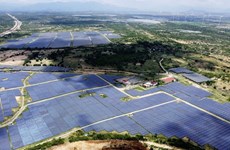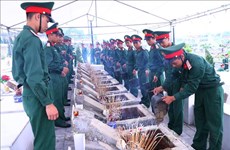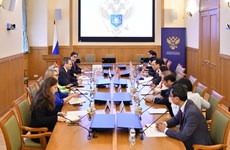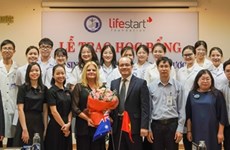Australian project promotes gender equality in agriculture
The Australian Government-funded “Integrating gender in agricultural value-chain research” project looks to settle gender social constrains, encourage ethnic men and women’s involvement in agricultural value chains, as well as promote the adoption of high-tech application towards a sustainable agriculture.
 Participants at the workshop (Photo: phunuvietnam.vn)
Participants at the workshop (Photo: phunuvietnam.vn)Hanoi (VNA) – The Australian Government-funded “Integrating gender in agricultural value-chain research” project looks to settle gender social constrains, encourage ethnic men and women’s involvement in agricultural value chains, as well as promote the adoption of high-tech application towards a sustainable agriculture.
Addressing a workshop held in Hanoi from November 15-16 to wrap up the 18-month project, Deputy Head of Mission at the Australian Embassy Rebecca Bryant said that the project is part of the Australian Government’s efforts to carry out its Vietnam Gender Equality Strategy during 2016-2020 period.
The Australian Government commits to improving the quality of life for women and girls in Vietnam via comprehensive approaching measures, she added.
Funded by the Australian Government through the Australian Centre for International Agricultural Research (ACIAR), the project, which will end in December, works with 10 ACIAR projects with a total investment of 17 million AUD (13 million USD), focusing on the value chain development in Vietnam and some Southeast Asian countries.
In the project’s framework, six field studies were carried out on how gender norms and relations affect agricultural practices, identify gender-based opportunities and challenges for ethnic male and female farmers. Also, it built a database for gender equality research and development, as well as establish a network for agricultural and gender scientists in the region.
The workshop brought together government officials and researchers from Vietnam, Myanmar, the Philippines, Laos and Cambodia, and ethnic farmers from the northern provinces of Son La and Dien Bien.
Vietnam’s northwest is home to many ethnic minority groups and has some of the highest levels of poverty and inequality in the country. The region has been a strong focus of the ACIAR program and Australian Aid.
ACIAR is part of the Australian Government’s Development Assistance Programme and contributes to that programme’s objectives of helping developing countries reduce poverty and achieve sustainable development. To date, ACIAR has commissioned and managed more than 1,500 research projects in around 36 countries. More than 150 institutions in partner countries have involved in collaborative projects with over 50 Australian research organisations.-VNA













